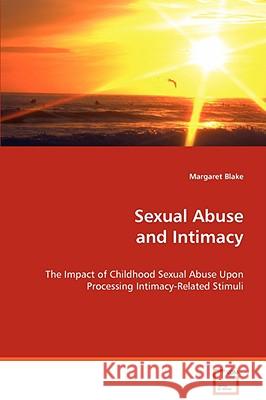Sexual Abuse and Intimacy » książka
Sexual Abuse and Intimacy
ISBN-13: 9783639067194 / Angielski / Miękka / 2008 / 60 str.
Adult survivors of childhood sexual abuse suffer a multitude of long-term effects, including distorted ideas about sexuality, inappropriate sexualized behaviors, fragmented identity, and feelings of powerlessness and betrayal (Olafson & Boat, 2000). Victimization influences an individuals self-concept, is associated with increased use of image-distorting defenses such as dissociation, denial, and projective identification, and increases the likelihood of future abuse. The current study sought to explore the cycle of abuse by examining implicit and explicit measures of intimacy among female inpatient and university participants. All participants completed a modified version of the Adult Dimensions Inventory (Chaffin, Wherry, Newlin, Crutchfield, & Dykman, 1997) in an effort to assess experience of childhood sexual abuse, and three versions of the Stroop Task: Neutral, General Threat, and Intimacy-Related. The university participants also completed the Experiences in Close Relationships Scale (ECR; Brennan et al., 1998), a self-report measure of attachment-related anxiety and avoidance. Results showed that a more intrusive form of sexual abuse led to a significant impact upon the cognitive processing of emotion-laden and neutral stimuli. This impact, however, manifested differently for inpatient and university participants: sexually abused inpatient participants tended to avoid processing information while abused university participants were distracted by emotion-laden stimuli. Finally, results showed that within the university sample there was a greater discrepancy between implicit and explicit measures of intimacy among sexually abused participants compared to non-abused participants.











